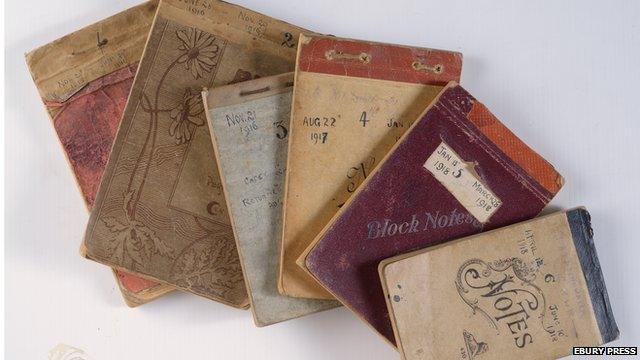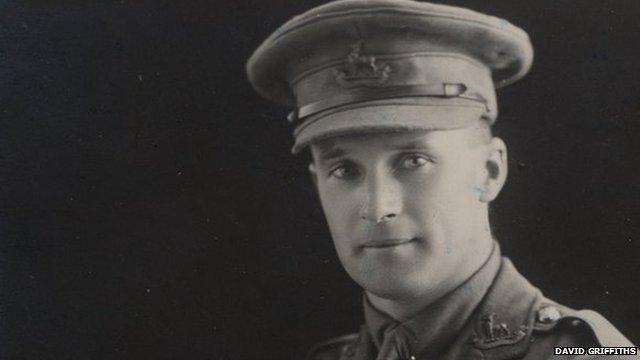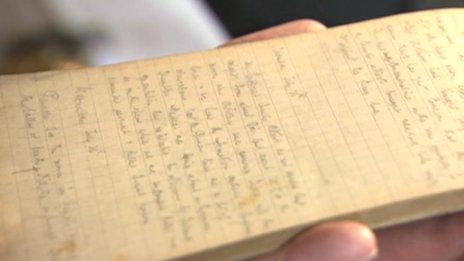'Secret' WWI diary paints 'vivid and visceral' picture
- Published

The diaries were written in six notebooks Harry Drinkwater kept in his tunic pocket
What can a secret diary kept by a Warwickshire man through the whole of World War I tell us about the experiences of the ordinary soldier in the war to end all wars?
"This is not war it's slaughter. No man, however brave, can advance against a sheet of bullets from the front and a shower of shells from overhead - it appears to me that the side who will win will be the one who can supply the last man."
That bitter assessment of WWI was written in pencil by Harry Drinkwater in a pocketbook he kept in his tunic pocket.
Born in Stratford-upon-Avon he joined the Birmingham Pals Battalion as a Private at the outbreak of the war, and served as a front-line soldier all through the conflict, becoming an officer and winning the Military Cross.
He won the medal in 1918 after he continued to lead a trench raid despite being badly wounded in his leg.
He was originally turned down by the army because he was too small.
"Half an inch short in height was not going to stop me getting into the army - the following Monday morning I again applied to Birmingham hoping that this time I might find a different medical board," he wrote in an early entry.
"I was not disappointed and taking my turn I was passed fit for general service and so, on paper at least, I became a soldier."
Sheltering in front-line trenches and dugouts he wrote a diary that eventually filled six pocketbooks and covered the entire course of the war.
Jon Cooksey, external, from the Western Front Association, who edited the diaries for publication, said they "represent the British Army's experience in microcosm".
"For me he almost becomes everyman and we can see the way through his eyes," he said.
"It's a very vivid and visceral account of the Great War - the reader is right there in the trenches with Harry - it is that immediate."

Harry Drinkwater was awarded the Military Cross in 1918
Dr Jonathan Boff, lecturer in war studies at the University of Birmingham, said keeping the diary could have got Mr Drinkwater into serious trouble.
"There wasn't strictly speaking anything in military law that said 'Thou shalt not keep a diary' but you were not supposed to keep any material that might be useful to the enemy," he said.
The diaries show after fighting in the battles of the Somme, Arras and Passchendaele and seeing so many of his friends die, Mr Drinkwater began to feel he was destined to survive the war.
"Time and again I missed death, so it seemed, by a fraction, but I always missed it. Many other occasions had yet to arise where one might say there was no reasonable or perhaps possible escape, yet somehow I got through."
Mr Drinkwater never married and after his death, in 1978, the diaries were auctioned by relatives.
They were bought by collector David Griffiths, who had only gone to the auction on a whim.
"It was my birthday and I saw a note in the paper that a set of World War I diaries were coming up for sale in Stratford-upon-Avon, so I drove over there only half intending to buy them.
"When I got there I was absolutely stunned, it was a magnificent diary," he said.

Soldiers who kept diaries in front-line trenches could face court martial
He was particularly taken by "the completeness" of the diaries and by their gripping storytelling style.
"Most [WWI diaries] are very short and very boring - 'I went up to the front line, it was uncomfortable, I came back in to rest' - this one is dynamic, emotional and exciting at times," he said.
The Imperial War Museum (IWM) holds a transcript of the diaries and said it will "no doubt prove of considerable interest to readers".
"Lieutenant Drinkwater's diaries are full of good historical detail and form exactly the kind of personal war record that IWM is keen to preserve in its archive," said its head of documents, Anthony Richards.
As the centenary of the outbreak of the war focuses attention on the conflict Dr Boff believes accounts like this will help people understand the war and the people who fought in it.
"The more of these diaries come into the public domain the more we will start to move, in my opinion, towards a more representative view of what the average soldier was thinking and doing during the war."
Harry's War by Harry Drinkwater, edited by Jon Cooksey and David Griffiths, is published by Ebury Press.
- Published11 November 2011